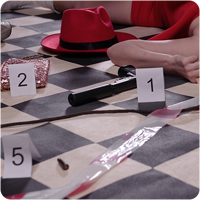Het arrangement Crime h45 is gemaakt met Wikiwijs van Kennisnet. Wikiwijs is hét onderwijsplatform waar je leermiddelen zoekt, maakt en deelt.
- Auteur
- Laatst gewijzigd
- 28-11-2025 11:45:47
- Licentie
-
Dit lesmateriaal is gepubliceerd onder de Creative Commons Naamsvermelding-GelijkDelen 4.0 Internationale licentie. Dit houdt in dat je onder de voorwaarde van naamsvermelding en publicatie onder dezelfde licentie vrij bent om:
- het werk te delen - te kopiëren, te verspreiden en door te geven via elk medium of bestandsformaat
- het werk te bewerken - te remixen, te veranderen en afgeleide werken te maken
- voor alle doeleinden, inclusief commerciële doeleinden.
Meer informatie over de CC Naamsvermelding-GelijkDelen 4.0 Internationale licentie.
Het thema 'Crime' is ontwikkeld door auteurs en medewerkers van StudioVO.
Fair Use
In de Stercollecties van StudioVO wordt gebruik gemaakt van beeld- en filmmateriaal dat beschikbaar is op internet. Bij het gebruik zijn we uitgegaan van fair use.
Meer informatie: Fair use
Mocht u vragen/opmerkingen hebben, neem dan contact op via de
helpdesk VO-content.
Aanvullende informatie over dit lesmateriaal
Van dit lesmateriaal is de volgende aanvullende informatie beschikbaar:
- Toelichting
- Dit thema valt onder de arrangeerbare leerlijn van de Stercollectie voor Engels voor havo, leerjaar 4 en 5. Dit is thema: 'Crime'. Dit thema omvat de volgende volgende onderwerpen: - Cybercrime - Young Offenders - Who dunnit - Forensic science In de grammaticaopdrachten worden past continuous vs past simple, past perfect tense en modal verbs behandeld.
- Leerniveau
- HAVO 4; HAVO 5;
- Leerinhoud en doelen
- Engels;
- Eindgebruiker
- leerling/student
- Moeilijkheidsgraad
- gemiddeld
- Studiebelasting
- 18 uur 0 minuten
- Trefwoorden
- arrangeerbaar, crime, cybercrime, engels, forensic science, h45, stercollectie, who dunnit, young offenders
Gebruikte Wikiwijs Arrangementen
VO-content Engels. (2021).
Forensic science h45

 Crime
Crime


 The subject of this lesson is 'Cybercrime'.
The subject of this lesson is 'Cybercrime'.


 Speaking
Speaking


 Task: Writing
Task: Writing Now we’re going to look at crime from the view point of Justice Ministers.
Now we’re going to look at crime from the view point of Justice Ministers. Crime And Punishment: Toughening The Young Offenders Act
Crime And Punishment: Toughening The Young Offenders Act Grammar
Grammar Task: Writing
Task: Writing The subject of this lesson is 'Thrillers'.
The subject of this lesson is 'Thrillers'.
 Why watching TV drama is good for your brains
Why watching TV drama is good for your brains
 Grammar
Grammar Song: Cardigan Weather
Song: Cardigan Weather Task
Task The subject of this lesson is 'Facts and figures'.
The subject of this lesson is 'Facts and figures'. Speaking (and Reading)
Speaking (and Reading) Reading
Reading High fashion detective work
High fashion detective work See how many clues you can identify in your own "crime scene". Choose a room (e.g., kitchen, living room, bedroom) or part of a room and go over it carefully, finding any trace evidence such as hair, clothing fibers, and chips of paint. You can collect these with a pair of tweezers and place them in envelopes or Ziplock bags to identify later. Are there any prints or scuff marks on the floor from shoes? Bits of soil or rock that might have been brought in?
See how many clues you can identify in your own "crime scene". Choose a room (e.g., kitchen, living room, bedroom) or part of a room and go over it carefully, finding any trace evidence such as hair, clothing fibers, and chips of paint. You can collect these with a pair of tweezers and place them in envelopes or Ziplock bags to identify later. Are there any prints or scuff marks on the floor from shoes? Bits of soil or rock that might have been brought in?
 Now you’re going to listen to a teen podcast. The teens are talking about general online safety.
Now you’re going to listen to a teen podcast. The teens are talking about general online safety.  Teenage hackers
Teenage hackers
